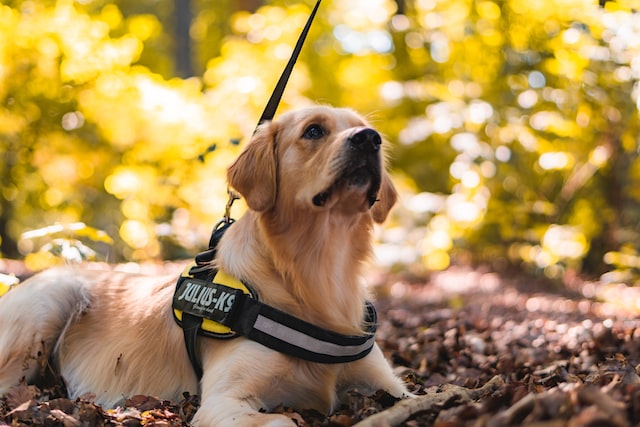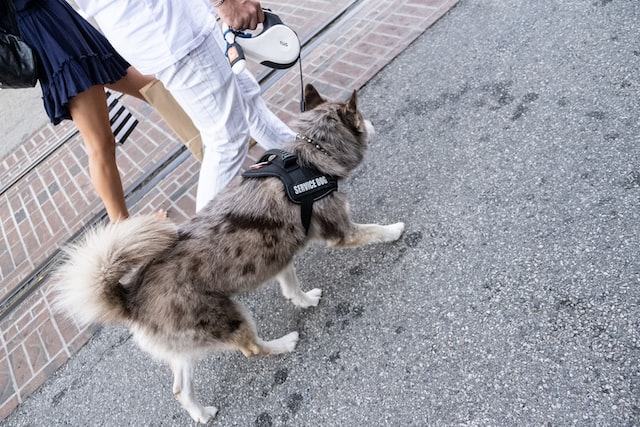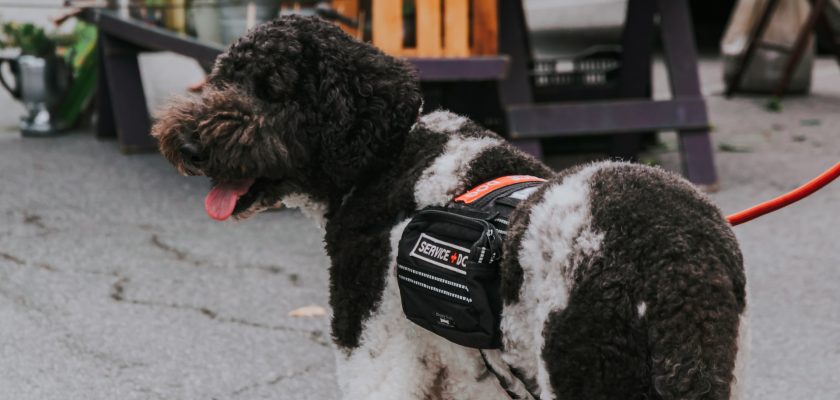You might wonder how to catch a fake service dog. The fact is, there are many different ways that you can tell whether or not a dog is actually a service dog. Here are some things to look for.
Detecting a fake service dog
Fake service dogs are becoming more common in recent years. These bogus animals may not be well-trained, but they can be distracting and damaging for real working service dogs. Here are some tips to detect a fake service dog and how to avoid them.
Real service dogs have impeccable leash manners and can work calmly in large crowds. They also know how to ignore other people and pets. Some illegitimate service dogs, however, are more aggressive than others. It’s best to approach a fake dog with a little kindness.
Fake service animals usually show off by showing off some other behavior, such as jumping on and licking you in line. You can tell if a dog is a fake because it doesn’t look like it’s been trained. But if a dog is well-trained, it’s unlikely to jump on or lick you.
Fake service dogs are usually made by pet owners who think “no pet” policies should not apply to them. Some scam artists take advantage of this to make a quick buck.

Photo by Dzmitry Dudov on Unsplash
One way to spot a fake service dog is to ask the manager if there is a “no dogs allowed” policy at the establishment. A fake animal can create a public uproar. That could lead to the business adopting a “no animals” policy.
If you see a fake service animal, the best thing to do is to report it to your local police department. The ADA also has a hotline for reporting fraudulent services. However, you should still be polite and wait for the person to get the OK before petting the dog.
If you do encounter a dog that seems to be a fake, try to explain the difference. This is particularly true if the dog has a vest or other distinguishing piece of gear.
If you are traveling, be aware that some planes have restrictions on carrying animals. A fake service dog may be overwhelmed by noise, smells and crowds. Even if the dog is well behaved, it could pose a problem.
Fake service dogs can be distracting to both a real service dog and its handler. That’s why it’s important to be vigilant.
Recognizing a real service dog
When you see someone walking a dog that looks like it could be a service dog, you may want to know if it’s actually one. A service dog has special training to help people with disabilities. Whether you’re a person who uses a wheelchair or a psychiatric disability, a real service dog can make a big difference in your life.
In the past few years, more people have been passing their pets off as service dogs. This has led to confusion and misrepresentation of service animals. The misrepresentation of pets as service animals can put the lives of people with disabilities at risk, but it’s also a problem for those who own legitimate service dogs.
If you are uncertain if the dog you’re interacting with is a legitimate service dog, you can ask the owner. You can also get proof that the dog has been trained to do specific tasks.
Service dogs can be any breed of dog. Some dogs wear vests or jackets to indicate that they are working. But, these items are not always the best way to distinguish a service dog from a non-service dog.
Another way to identify a service dog is to look for behaviors. Most real service dogs don’t bark or whine unprovoked. They’ll wait for cues to arrive, and won’t get spooked by large crowds or loud noises.
If you encounter a fake service dog, report it to the local police. This is important because you can be fined up to $1,000 if you are caught bringing a fake service dog into a public place.
Real service dogs are impeccably trained, and they never seek attention from other people. Instead, they stick close to their owners’ sides. They’re well-behaved, and they never pull on your leash.
In many states, it’s illegal to pass your pet off as a service animal. But there are exceptions. For example, if you live in California, you can legally pet your pet at work.
Until more states introduce laws to address the issue, you should take care when approaching a non-service animal. Make sure to ask permission before petting it.
Distinguishing between legitimate and fraudulent service dogs
When a dog has been trained to assist a person with a disability, it is called a service animal. However, there are some instances where an owner may pretend to own a service animal. This can cause problems for both the pet and the owner.
Fake service dogs are not only ethically wrong, but they can also hurt public perception of service animals. This is why state governments are attempting to put measures in place to deter people from trying to pass off regular pets as service animals.

Photo by Brian Wangenheim on Unsplash
Getting caught with a fake service animal can result in up to a $1,000 fine. Depending on the state, you can also be imprisoned for six months. These laws are gaining popularity, and it is likely that they will soon be a nationwide safeguard.
In order to spot a fake service dog, you need to recognize the signs. One way to do this is to find out whether or not the dog has received expert training. It is also important to know how to report a scam. If you suspect a fraudulent service dog, you can call your local police department.
Another important factor is age. Research shows that interpersonal trust increases with age. A recent surge in the number of emotional support animals has also been cited as a possible reason for the confusion.
The law varies from state to state, but in general, the penalties for putting a vest on your dog can be as severe as a jail sentence. Alternatively, you can be charged with $500 for misbehaving with your pet.
The best solution is to educate the public on the dangers of faking a service dog. While it is not impossible to get a pet to behave like a service animal, it is not recommended. Service dogs require a lot of training to achieve this, and there are no guarantees.
If you’re trying to get an ESA certified, you can end up having to make last minute arrangements. This can be difficult, since it is not legally recognized by the ADA. Also, there are many companies who offer certification services, but the ADA does not accredit them.
Getting a service dog from a licensed mental health professional
There are a number of reasons why people would want to get a service dog from a licensed mental health professional. For example, people with depression or anxiety can benefit from an emotional support animal.
Service dogs provide benefits to individuals with physical, cognitive, and psychiatric disabilities. In fact, there are a number of organizations that offer training programs and scholarship funds to those looking to get a service dog.
The American with Disabilities Act (ADA) defines a service animal as any animal that is individually trained to perform tasks or work that an individual with a disability needs. Some of the types of dogs that are considered service animals include guide dogs, hearing dogs, and emotional support animals.
If a person qualifies for a service dog, he or she will need to provide a doctor’s letter stating that they are suffering from a disability that makes it difficult for them to do certain things on their own. Those who are not suffering from a disability but pretend to have one to gain access to public places may be putting themselves in jeopardy.
Some states are imposing penalties for pet owners who are falsely claiming to have a service dog. These penalties can include fines and community service. They also vary from state to state.
Businesses are often reluctant to accept a fake service dog. This creates a tense situation for both the business and the individual with a disability.
The best way to fight these fraudulent pets is to educate the public. If you suspect a pet is a service dog, report it to the local police. You can even file a complaint with the ADA.
Most states have enacted their own laws regarding illegitimate pets. Some states require a license or certificate from the dog owner. Others do not. It is also possible to have a service dog without a certificate.
A true service dog is a lifesaver for a disabled person. Fake service dogs can damage the public’s perception of service dogs. Moreover, they can endanger real service dogs.
People with disabilities should be given a break when it comes to being discriminated against because of their disability. Getting a service dog from a licensed mental heath professional is the best way to protect the integrity of the public’s understanding of service dogs.
